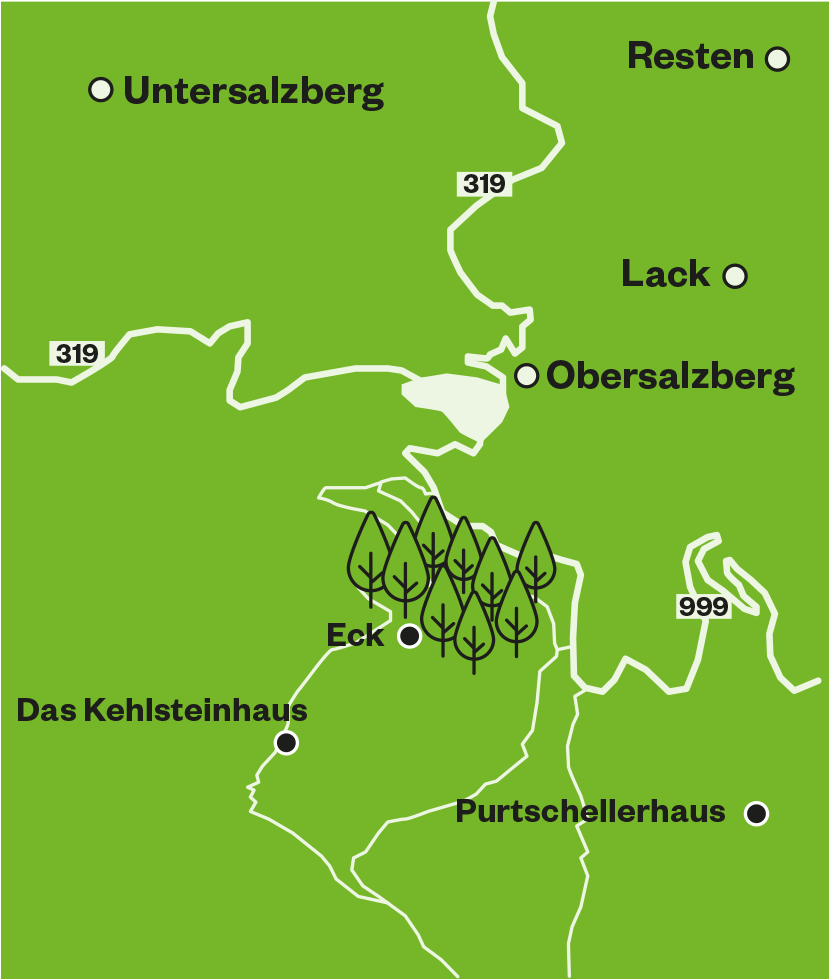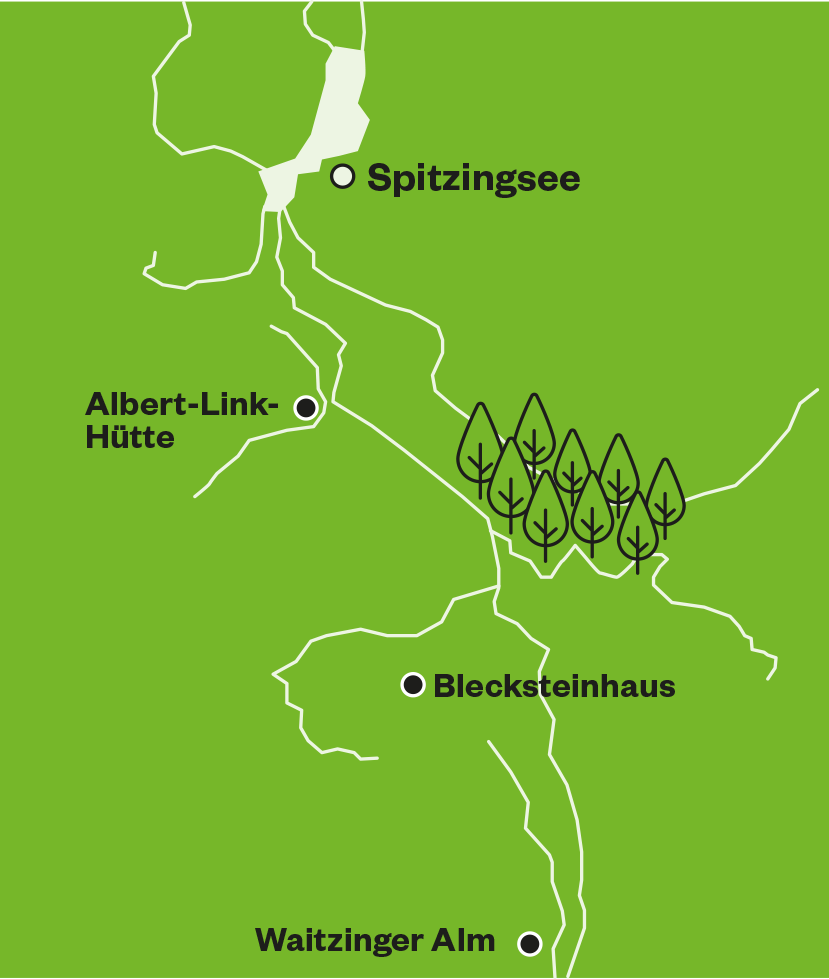We're helping the forests and rebuilding it!
Not only streets and buildings need to be rebuilt periodically. Even our forests require renovation! Fragile forests need strong trees in order to be transformed into resilient mixed woodlands.
We are contributing to reforestation with our "Plant-a-tree-Campaign".
For years, we have observed our weather becoming more and more extreme. Periods of hot temperatures and severe weather are increasing. The effects of climate change are negatively impacting our woodlands; the outlook is particularly grim for spruce forests. Because their roots are shallow, spruces rely on consistent rainfall and can experience significant damage in strong storms. Climate change has the potential to cause more degradation to our forests in the future.
Every 25th Banff Tour Ticket = 1 tree
Along with our partners Vaude and Visit Tirol, we want to help prepare our forests for climate change. Therefore, we will plant one tree for every 25th visitor of the BANFF Tour.

This incredible impact continues to grow as we've already planted more than 6,277 trees together. Let's maintain this momentum—let's plant even more trees in the next weeks and years!
Where our trees grow


Fast-growing spruces are the most important trees for reforestation. In order for the forests to survive, they must be replenished. We can transform our fragile coniferous forests into resilient mixed woodlands, consisting of 30% broad-leafed trees or firs. This process will take several decades, so we must start today.
Why we should protect our forests:
10,000 square metres of forest...
- filter up to 50 tons of soot and dust from the air
- release up to 30 tons of oxygen per year
- store about 10 tons of CO₂ per year
- can produce up to 160,000 cubic metres of new groundwater in its lifespan
Thank you to all Banff Tour visitors for your support!
10 Tips to Protect Trees and Conserve Forests
2. Use recycled paper

4. Buy eco-friendly products and foods

6. Avoid products containing palm oil

8. Talk about your commitment

10. Use a search engine with an ecological approach

Here you'll find all dates of the BANFF Tour:
Austria
|
Mon, 13/04/26, 20:30
Wien , CINEPLEXX Millennium City Wien
|
Wien , CINEPLEXX Millennium City Wien | Buy Tickets Tickets |
|
Tue, 14/04/26, 20:15
Salzburg, Mozartkino
|
Salzburg, Mozartkino | Buy Tickets Tickets |
|
Fri, 17/04/26, 19:30
Innsbruck, Haus der Musik
|
Innsbruck, Haus der Musik | Buy Tickets Tickets |
|
Sat, 18/04/26, 20:00
Wörgl, Cineplexx Wörgl
|
Wörgl, Cineplexx Wörgl | Buy Tickets Tickets |
|
Sun, 19/04/26, 15:00
Linz, Central Linz
|
Linz, Central Linz | Buy Tickets Tickets |
|
Sun, 19/04/26, 19:00
Linz, Central Linz
|
Linz, Central Linz | Buy Tickets Tickets |
|
Mon, 20/04/26, 20:30
Graz, Annenhof Kino
|
Graz, Annenhof Kino | Buy Tickets Tickets |
|
Wed, 22/04/26, 20:00
Wien, Gartenbaukino
|
Wien, Gartenbaukino | Buy Tickets Tickets |
Belgium
|
Wed, 11/03/26, 20:00
Genk, Euroscoop Genk
|
Genk, Euroscoop Genk | Buy Tickets Tickets |
|
Thu, 12/03/26, 19:30
Antwerpen, Zuiderpershuis
|
Antwerpen, Zuiderpershuis | Buy Tickets Tickets |
|
Sat, 14/03/26, 15:00
Brussels, Espace Lumen
|
Brussels, Espace Lumen | Buy Tickets Tickets |
|
Sat, 14/03/26, 19:00
Bruxelles, Espace Lumen
|
Bruxelles, Espace Lumen | Buy Tickets Tickets |
|
Thu, 26/03/26, 19:00
Huy, Cultural Centre of Huy
Host: The Next Venture
|
Huy, Cultural Centre of Huy Host: The Next Venture | Buy Tickets Tickets |
Germany
|
Mon, 23/02/26, 19:30
München, Alte Kongresshalle
|
München, Alte Kongresshalle | Buy Tickets Tickets |
|
Tue, 24/02/26, 19:30
Rosenheim, Ballhaus
|
Rosenheim, Ballhaus | Buy Tickets Tickets |
|
Fri, 27/02/26, 20:00
Augsburg, CinemaxX
|
Augsburg, CinemaxX | Buy Tickets Tickets |
|
Sat, 28/02/26, 15:00
Kempten, Kornhaus Kempten
|
Kempten, Kornhaus Kempten | Buy Tickets Tickets |
|
Sat, 28/02/26, 19:00
Kempten, Kornhaus Kempten
|
Kempten, Kornhaus Kempten | Buy Tickets Tickets |
|
Sun, 01/03/26, 16:00
München, Rio Filmpalast
|
München, Rio Filmpalast | Buy Tickets Tickets |
|
Sun, 01/03/26, 20:00
München, Rio Filmpalast
|
München, Rio Filmpalast | Buy Tickets Tickets |
|
Mon, 02/03/26, 20:00
Ravensburg, Die Burg
|
Ravensburg, Die Burg | Buy Tickets Tickets |
|
Tue, 03/03/26, 20:00
Villingen-Schwenningen, CineStar
|
Villingen-Schwenningen, CineStar | Buy Tickets Tickets |
|
Wed, 04/03/26, 20:00
Tübingen, Museum Kino
|
Tübingen, Museum Kino | Buy Tickets Tickets |
|
Thu, 05/03/26, 20:00
Stuttgart, GLORIA 1
|
Stuttgart, GLORIA 1 | Buy Tickets Tickets |
|
Fri, 06/03/26, 20:00
Saarbrücken, Cinestar
|
Saarbrücken, Cinestar | Buy Tickets Tickets |
|
Sat, 07/03/26, 15:00
Burghausen, Ankersaal
Host: DAV Sektion Burghausen
|
Burghausen, Ankersaal Host: DAV Sektion Burghausen | Buy Tickets Tickets |
|
Sat, 07/03/26, 19:00
Burghausen, Ankersaal
Host: DAV Sektion Burghausen
|
Burghausen, Ankersaal Host: DAV Sektion Burghausen | Buy Tickets Tickets |
|
Sat, 07/03/26, 19:30
Siegburg, Cineplex Siegburg
Host: DAV Sektion Rhein-Sieg
|
Siegburg, Cineplex Siegburg Host: DAV Sektion Rhein-Sieg | Buy Tickets Tickets |
|
Sun, 08/03/26, 20:00
Bremen, CinemaxX
|
Bremen, CinemaxX | Buy Tickets Tickets |
|
Mon, 09/03/26, 20:00
Münster, Cineplex Münster
|
Münster, Cineplex Münster | Buy Tickets Tickets |
|
Tue, 10/03/26, 20:00
Hamburg, CinemaxX
|
Hamburg, CinemaxX | Buy Tickets Tickets |
|
Wed, 11/03/26, 20:00
Paderborn, UCI Kinowelt
|
Paderborn, UCI Kinowelt | Buy Tickets Tickets |
|
Thu, 12/03/26, 19:30
Künzelsau, Prestige Filmtheater
Host: Prestige Filmtheater
|
Künzelsau, Prestige Filmtheater Host: Prestige Filmtheater | Buy Tickets Tickets |
|
Thu, 12/03/26, 20:00
Aachen, Cineplex Aachen
|
Aachen, Cineplex Aachen | Buy Tickets Tickets |
|
Sat, 14/03/26, 17:00
Darmstadt, DAV Kletterzentrum
|
Darmstadt, DAV Kletterzentrum | Buy Tickets Tickets |
|
Sat, 14/03/26, 20:30
Darmstadt, DAV Kletterzentrum
|
Darmstadt, DAV Kletterzentrum | Buy Tickets Tickets |
|
Sun, 15/03/26, 17:00
Karlsruhe, Filmtheater Schauburg
|
Karlsruhe, Filmtheater Schauburg | Buy Tickets Tickets |
|
Sun, 15/03/26, 18:00
Schwerte, Rohrmeisterei
Host: Bürgerstiftung Rohrmeisterei
|
Schwerte, Rohrmeisterei Host: Bürgerstiftung Rohrmeisterei | Buy Tickets Tickets |
|
Sun, 15/03/26, 20:30
Karlsruhe, Filmtheater Schauburg
|
Karlsruhe, Filmtheater Schauburg | Buy Tickets Tickets |
|
Mon, 16/03/26, 20:00
Frankfurt am Main, Cinestar Metropolis
|
Frankfurt am Main, Cinestar Metropolis | Buy Tickets Tickets |
|
Tue, 17/03/26, 20:00
Köln, Cinedom
|
Köln, Cinedom | Buy Tickets Tickets |
|
Thu, 19/03/26, 19:30
Ulm, Kornhaus
|
Ulm, Kornhaus | Buy Tickets Tickets |
|
Fri, 20/03/26, 19:30
Heidelberg, Musik- und Singschule
|
Heidelberg, Musik- und Singschule | Buy Tickets Tickets |
|
Sun, 22/03/26, 15:00
Berlin, Urania
|
Berlin, Urania | Buy Tickets Tickets |
|
Sun, 22/03/26, 19:00
Berlin, Urania
|
Berlin, Urania | Buy Tickets Tickets |
|
Mon, 23/03/26, 19:30
Potsdam, Thalia
|
Potsdam, Thalia | Buy Tickets Tickets |
|
Mon, 23/03/26, 20:00
Bamberg, Konzerthalle
|
Bamberg, Konzerthalle | Buy Tickets Tickets |
|
Tue, 24/03/26, 19:30
Bayreuth, DAS ZENTRUM
|
Bayreuth, DAS ZENTRUM | Buy Tickets Tickets |
|
Wed, 25/03/26, 19:30
Nürnberg, Kleine Meistersingerhalle
|
Nürnberg, Kleine Meistersingerhalle | Buy Tickets Tickets |
|
Wed, 25/03/26, 20:00
Hamburg, CinemaxX
|
Hamburg, CinemaxX | Buy Tickets Tickets |
|
Thu, 26/03/26, 19:30
Regensburg, Kolpinghaus
|
Regensburg, Kolpinghaus | Buy Tickets Tickets |
|
Thu, 26/03/26, 20:00
Kiel, Studio Filmtheater
|
Kiel, Studio Filmtheater | Buy Tickets Tickets |
|
Mon, 13/04/26, 20:00
Dresden, Rundkino
|
Dresden, Rundkino | Buy Tickets Tickets |
|
Tue, 14/04/26, 19:30
Erfurt, Kaisersaal
|
Erfurt, Kaisersaal | Buy Tickets Tickets |
|
Wed, 15/04/26, 19:30
Hannover, Theater am Aegi
|
Hannover, Theater am Aegi | Buy Tickets Tickets |
|
Thu, 16/04/26, 19:30
Leipzig, Werk 2
|
Leipzig, Werk 2 | Buy Tickets Tickets |
|
Fri, 17/04/26, 20:00
Würzburg, CinemaxX
|
Würzburg, CinemaxX | Buy Tickets Tickets |
|
Sat, 18/04/26, 15:00
Mainz, Johannes Gutenberg Universität
|
Mainz, Johannes Gutenberg Universität | Buy Tickets Tickets |
|
Sat, 18/04/26, 19:00
Mainz, Johannes Gutenberg Universität
|
Mainz, Johannes Gutenberg Universität | Buy Tickets Tickets |
|
Sun, 19/04/26, 15:00
Düsseldorf, Savoy Theater
|
Düsseldorf, Savoy Theater | Buy Tickets Tickets |
|
Sun, 19/04/26, 19:00
Düsseldorf, Savoy Theater
|
Düsseldorf, Savoy Theater | Buy Tickets Tickets |
|
Mon, 20/04/26, 20:00
Essen, Lichtburg
|
Essen, Lichtburg | Buy Tickets Tickets |
|
Tue, 21/04/26, 20:00
Braunschweig, Astor Filmtheater
|
Braunschweig, Astor Filmtheater | Buy Tickets Tickets |
|
Wed, 22/04/26, 19:30
Mannheim, Capitol
|
Mannheim, Capitol | Buy Tickets Tickets |
|
Thu, 23/04/26, 19:30
Schwäbisch-Gmünd, Prediger
|
Schwäbisch-Gmünd, Prediger | Buy Tickets Tickets |
|
Fri, 24/04/26, 19:30
Stuttgart, Liederhalle Stuttgart
|
Stuttgart, Liederhalle Stuttgart | Buy Tickets Tickets |
|
Sun, 26/04/26, 20:00
München, Alte Kongresshalle
|
München, Alte Kongresshalle | Buy Tickets Tickets |
Liechtenstein
|
Fri, 27/03/26, 19:30
Schaan, TAK Liechtenstein
|
Schaan, TAK Liechtenstein | Buy Tickets Tickets |
Luxembourg
|
Tue, 10/03/26, 19:30
Bettembourg, Cine le Paris
|
Bettembourg, Cine le Paris | Buy Tickets Tickets |
Netherlands
|
Fri, 13/03/26, 20:15
Rotterdam, Pathé Schouwburgplein Rotterdam
|
Rotterdam, Pathé Schouwburgplein Rotterdam | Buy Tickets Tickets |
|
Sun, 15/03/26, 19:30
Eindhoven, Evoluon Eindhoven - Philips Hall
|
Eindhoven, Evoluon Eindhoven - Philips Hall | Buy Tickets Tickets |
|
Mon, 16/03/26, 20:00
Amsterdam, Meervaart Theater
|
Amsterdam, Meervaart Theater | Buy Tickets Tickets |
|
Tue, 17/03/26, 19:00
Haarlem, Kinepolis Haarlem
|
Haarlem, Kinepolis Haarlem | Buy Tickets Tickets |
|
Wed, 18/03/26, 19:00
Utrecht, Kinepolis Jaarbeurs Utrecht
|
Utrecht, Kinepolis Jaarbeurs Utrecht | Buy Tickets Tickets |
|
Thu, 19/03/26, 19:30
Den Haag, Theater de Regentes
|
Den Haag, Theater de Regentes | Buy Tickets Tickets |
|
Fri, 20/03/26, 19:00
Groningen, Kinepolis Groningen
|
Groningen, Kinepolis Groningen | Buy Tickets Tickets |
Slovenia
|
Tue, 21/04/26, 20:00
Ljubljana, Kino Bežigrad Gledališče
|
Ljubljana, Kino Bežigrad Gledališče | Buy Tickets Tickets |
Switzerland
|
Fri, 27/02/26, 19:30
St. Gallen, KUGL St. Gallen
|
St. Gallen, KUGL St. Gallen | Buy Tickets Tickets |
|
Sat, 28/02/26, 20:00
Lausanne, Casino de Montbenon
|
Lausanne, Casino de Montbenon | Buy Tickets Tickets |
|
Sun, 01/03/26, 19:30
Luzern, Paulusheim Luzern
|
Luzern, Paulusheim Luzern | Buy Tickets Tickets |
|
Mon, 02/03/26, 19:30
Zürich, Volkshaus
|
Zürich, Volkshaus | Buy Tickets Tickets |
|
Tue, 03/03/26, 19:30
Bern, Freies Gymnasium Bern
|
Bern, Freies Gymnasium Bern | Buy Tickets Tickets |
|
Wed, 04/03/26, 19:30
Thun, Rex Kino
|
Thun, Rex Kino | Buy Tickets Tickets |
|
Thu, 05/03/26, 19:30
Basel/Münchenstein, Hofmatt Saal
|
Basel/Münchenstein, Hofmatt Saal | Buy Tickets Tickets |
|
Fri, 06/03/26, 19:30
Genève, Cinerama Empire
|
Genève, Cinerama Empire | Buy Tickets Tickets |
|
Sun, 08/03/26, 19:30
Chur, Marsöl Saal
|
Chur, Marsöl Saal | Buy Tickets Tickets |




















